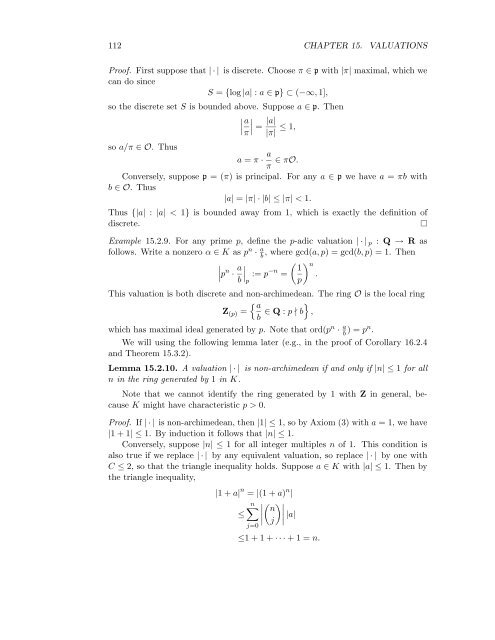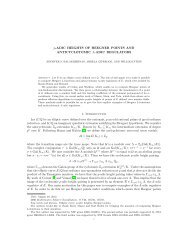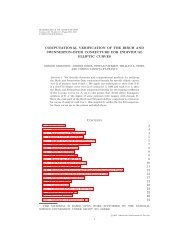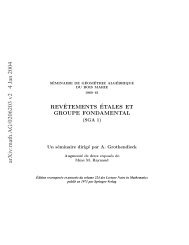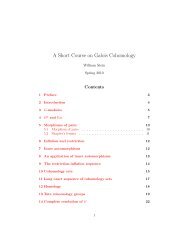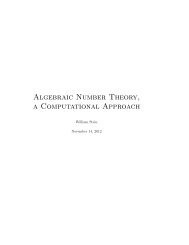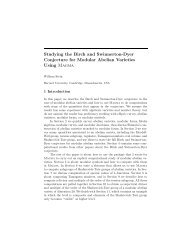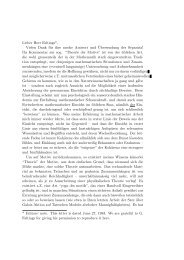A Brief Introduction to Classical and Adelic Algebraic ... - William Stein
A Brief Introduction to Classical and Adelic Algebraic ... - William Stein
A Brief Introduction to Classical and Adelic Algebraic ... - William Stein
Create successful ePaper yourself
Turn your PDF publications into a flip-book with our unique Google optimized e-Paper software.
112 CHAPTER 15. VALUATIONS<br />
Proof. First suppose that | · | is discrete. Choose π ∈ p with |π| maximal, which we<br />
can do since<br />
S = {log |a| : a ∈ p} ⊂ (−∞, 1],<br />
so the discrete set S is bounded above. Suppose a ∈ p. Then<br />
<br />
<br />
a<br />
<br />
<br />
=<br />
π<br />
|a|<br />
≤ 1,<br />
|π|<br />
so a/π ∈ O. Thus<br />
a = π · a<br />
∈ πO.<br />
π<br />
Conversely, suppose p = (π) is principal. For any a ∈ p we have a = πb with<br />
b ∈ O. Thus<br />
|a| = |π| · |b| ≤ |π| < 1.<br />
Thus {|a| : |a| < 1} is bounded away from 1, which is exactly the definition of<br />
discrete.<br />
Example 15.2.9. For any prime p, define the p-adic valuation | · | p : Q → R as<br />
follows. Write a nonzero α ∈ K as pn · a<br />
b , where gcd(a, p) = gcd(b, p) = 1. Then<br />
<br />
<br />
p n · a<br />
<br />
<br />
:= p<br />
b p<br />
−n n 1<br />
= .<br />
p<br />
This valuation is both discrete <strong>and</strong> non-archimedean. The ring O is the local ring<br />
<br />
a<br />
<br />
Z (p) = ∈ Q : p ∤ b ,<br />
b<br />
which has maximal ideal generated by p. Note that ord(pn · a<br />
b ) = pn .<br />
We will using the following lemma later (e.g., in the proof of Corollary 16.2.4<br />
<strong>and</strong> Theorem 15.3.2).<br />
Lemma 15.2.10. A valuation | · | is non-archimedean if <strong>and</strong> only if |n| ≤ 1 for all<br />
n in the ring generated by 1 in K.<br />
Note that we cannot identify the ring generated by 1 with Z in general, because<br />
K might have characteristic p > 0.<br />
Proof. If | · | is non-archimedean, then |1| ≤ 1, so by Axiom (3) with a = 1, we have<br />
|1 + 1| ≤ 1. By induction it follows that |n| ≤ 1.<br />
Conversely, suppose |n| ≤ 1 for all integer multiples n of 1. This condition is<br />
also true if we replace | · | by any equivalent valuation, so replace | · | by one with<br />
C ≤ 2, so that the triangle inequality holds. Suppose a ∈ K with |a| ≤ 1. Then by<br />
the triangle inequality,<br />
|1 + a| n = |(1 + a) n |<br />
n<br />
<br />
<br />
<br />
≤ <br />
n <br />
|a|<br />
j<br />
j=0<br />
≤1 + 1 + · · · + 1 = n.


